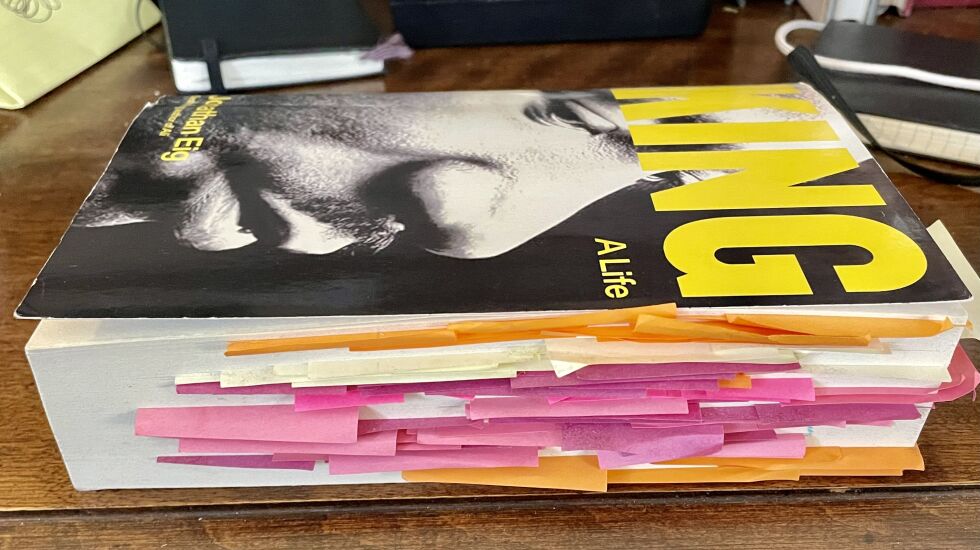
I don’t like to write in books. Even bound galleys — it just feels wrong. Besides, you still have to later find the page where the underlined passage appears. Better to slap a Post-It note by the parts you want to recall later.
So when I pulled down my advance copy of Jonathan Eig’s “King: A Life,” which comes out Tuesday, I smiled. The pages sprout with magenta and orange notes. It’s been five months since I read it, before the King holiday last January. While I knew the book was interesting, I forgot just how interesting.
So interesting that I don’t even have to check the citations to immediately remember riveting details, such as that for the first 20 years of his life he went by “Mike King.” That one fact alone might unsettle your entire view of what being Martin Luther King Jr. must have been like. Not the young preacher, waiting for the greatness he knew was coming. But just Mike, just a regular guy, maybe more sensitive than most, who threw himself out of a second floor window when his grandmother died. Twice.
A man deeply flawed — he bit his nails, liked to play pool, liked to drink. King had a habit of plagiarizing, in school, in speeches and later books. He cheated in writing, and he cheated on his wife.
Not a particularly flattering portrait of King, except for the civil rights part. Yet one being celebrated as the new standard King biography.
“Magnificent,” wrote the Economist.
“The most compelling account of King’s life in a generation” wrote the Washington Post.
Why? Because life is messy. And those who keep alive King’s dream of a country where people are judged, not by the color of their skin but by the content of their character, know this must be done by facing reality, not concocting self-flattering mythologies.
“Great men,” Eig writes, quoting Emerson, “have not been boasters and buffoons.”
Speaking of which. Florida Gov. Ron DeSantis came to Illinois Friday, and spoke in Peoria, part of his sputtering, if not stillborn, presidential campaign. DeSantis again lashed out at “woke” — the catchall scare term for acknowledging that we live in a society built on racism, or that LGBTQ people exist.
“Because woke represents a war on truth, we have no choice but to wage a war on woke and that is what we’re doing in Florida,” DeSantis said.
Eig’s book presents a different kind of woke.
“We the Negro people are now not afraid,” an Alabama grocery worker named Carrie Allen says in 1963. “We have woke up.”
DeSantis has tried to purge Florida schools and libraries of books similar to Eig’s, books that touch on issues of race and sexuality in a clear and candid way.
Why? Because 1) being fascists, they need someone to demonize; 2) being fascists, they want to control all elements of life, including what books you can read; and 3) being fascists, they prefer their history both watered down and sweetened up.
Read “King: A Life” and you’ll see why they’re so afraid of books. Eig’s history just won’t stay put in the past.
“Most white Americans ... resisted the notion that the war had been caused by slavery,” Eig writes. “They treated both the North and South as noble American warriors. Black people were, at best, parenthetical figures in American history books.”
The whole trans restroom flap is just an updated version of a much older fixation.
“I just can’t hardly see a Negro using the same restroom that I use,” a Birmingham resident explains in 1963. “Not that I think that I’m the Almighty. ... It’s just a little matter of the cleanliness and the morals and everything else.”
Reading Eig’s book, it becomes clear how we live in the same racist society, slightly altered and updated. In some ways it’s worse today. Then, governors in the South vowed to abolish public schools rather than integrate them. Now we have school vouchers, so white parents can walk away from the public school system on the taxpayer dime.
The book defies summary, except to say that one central lesson is, you don’t have to be superhuman to fight for social justice. You don’t have to be perfect, or flawless. No one is. You don’t have to always succeed. No one does. What you have to do is always try, and never give up. Because the forces against you certainly never will.







